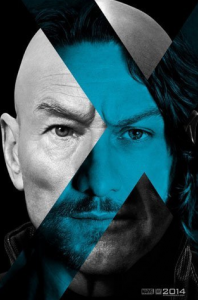
 The surprising thing about “X-Men: Days of Future Past” is how well it fits into the franchise canon started back in 2000. And as action packed as it is, the quiet moments work best and, like 2011’s “First Class,” the superhero universe of the X-Men is a cut above its comparatively cheesier brethren.
The surprising thing about “X-Men: Days of Future Past” is how well it fits into the franchise canon started back in 2000. And as action packed as it is, the quiet moments work best and, like 2011’s “First Class,” the superhero universe of the X-Men is a cut above its comparatively cheesier brethren.
The film begins sometime in the near future, we see a scorched landscape controlled, it seems, by autonomous machines. Mutants are the enemy and the machines have evolved to the point where no one is safe. A battle is still raging with several familiar mutant heroes fighting, mostly in vain, to gain a foothold against the frightful Sentinels. But all is not lost, Professor X (Patrick Stewart) and Magneto (Ian McKellen) hatch a plan to send the consciousness of one of the team back into the past. In doing so, the hope is that, armed with knowledge of a possible grim future, the wrongs can be righted and new present can be created.
Center stage is Wolverine (Hugh Jackman), whose unique healing powers prove to be very useful when it comes to tripping the time travel continuum. Falling back into the 1970s, Wolverine must convince a jaded and alcoholic, Charles Xavier (James McAvoy) to join forces with Magneto (Michael Fassbender) and change the future.
While not nearly as much fun as the last adventure that effectively rebooted the franchise, “Days of Future Past” has more narrative weight. The metaphor for racism that the mutant struggle represents is not lost as the United States recovers from the regretful setbacks in Vietnam and is forced confront a new Cold War menace. Enter Dr. Bolivar Trask (Peter Dinklage), who has developed a machine that can detect the presence of a mutant. Once identified, Trask’s solution to the mutant problem is to kill them. This terribly heavy-handed approach is a one of the film’s narrative failings, especially considering that it does away with all judicial process that is one of the bedrock fundamental rights all American’s share. Trask hints that mutants aren’t even human, rather, they are a completely different species. One can logically imagine that that means no trials and the death penalty is okay.
Trask initially runs into trouble as he tries to sell his diabolical plan to Congress. When turned away, Trask decides to go to our enemies. He reasons that the mutant war could unite all nations in a common conflict and bring world peace. Again, the naivety of this simplistic approach is another narrative failing. The setup is layered with many characters and a bit of revisionist history. It is enough to say that the intellectual ambitions of the story are somewhat restricted by the comic book requirements. And grand action set-pieces follow that should satisfy blockbuster comic fans.
One of the best new characters introduced in this film is Quicksilver (“American Horror Story’s” Evan Peters). Comic fans already know that he’s the son of Magneto. Oddly, this character appeared very briefly (I don’t remember it) in the last Captain America movie, where he is played by Kick-Ass Aaron Taylor-Johnson. The Marvel universe in the movies is fractured with the X-Men owned by Twentieth Century Fox, Spider-Man a Sony Property, and the Avengers in the control of Disney/Marvel Entertainment. But I’m not sure if there have been any cross-over characters until Quicksilver. In “Days of Future Past,” Quicksilver is a joy to behold. My thinking is that this character might get his own movie, but the questions are: which actor will play him and what studio will produce the movie?
Returning to the director chair for “Days of Future Past” is Bryan Singer the visionary auteur who originally gave birth to the movie franchise. Frankly, after Matthew Vaughn got it so very right with “First Class,” Singer had to be under a great deal of pressure to get things “right-er.” And he certainly does.
A carry over from “First Class” is the visual scope that, even though the film was shot digitally, has a soft lovely look reminiscent of films of the 1970s, which makes perfect sense given the setting. But like, say, “Her” the color look employed with the Arri camera is really second to none. One wonders why we need 4K or even higher resolution when a director of photography can get such color and dynamic range out of the somewhat lower 2.8K source format. Needless to say, watching “Days of Future Past” is very pleasing even with the 3D glasses hanging over my proscription variety.
Much has been discussed of director Singer’s legal struggles, which took him out of press conferences and interviews. This is regretful, because it would be good to learn more about his process and talk with him about how he used the success of “First Class” to breathe new life into the X-Men. I suppose it may take a court to grant a motion to dismiss the pending litigation to have that discussion. Filmmakers everywhere are probably waiting to read more about it.
But I mentioned that “X-Men: Days of Future Past” works best with the quieter moments that help it properly fit into the franchise canon. Watch for this, pay attention, unlike some of the other superhero comic adaptations, this film is just as interested in making us think as it is in providing thrills.
